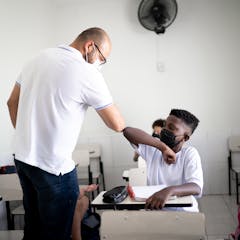
Articles on New research
Displaying 281 - 300 of 417 articles

While longer naps are a normal part of aging, excessively long dozes could be a warning signal for cognitive decline.

A focus on raw intellectual talent may unintentionally create a cutthroat workplace culture. New research suggests women’s preference to avoid that environment may contribute to gender gaps in some fields.

During the pandemic, health care providers began prescribing abortion pills without requiring in-person exams. This practice could help people access the care they need when abortion rights are in limbo.

To date, the program has provided nearly $10 million to roughly 137,000 of the country’s poorest citizens.

Rising temperatures mean longer, earlier pollen seasons, but the bigger problem is what carbon dioxide will do to the amount of pollen being released. A 200% increase is possible this century.

Although treatments for Ebola have helped many people overcome this deadly disease, the virus can persist in the brain and cause a lethal relapse.

Disruptions to the lung microbiome are linked to a number of respiratory conditions in both children and adults.

Plentiful meat substitutes might be making plant-based diets more popular.

A wealth of evidence supports the protective mental health effects of gender-affirming care, despite ongoing legislation that asserts otherwise.

Social scientists determined that body mass index growth declined for children of low-income parents in states that had expanded their Medicaid programs.

A study of 3,000 companies found a correlation between local ‘social capital’ – which measures such variables as voter turnout and census response rates – and more women on corporate boards.

New research shows women paid an average of $18 less per flight than men in the same position at the same company, mainly because they consistently booked earlier.

A scholar warns that women will continue to be underrepresented in STEM careers unless educators focus on helping girls do better in advanced math courses in high school.

Pinpointing the chemical compounds that make a fruit tasty to consumers can help producers breed for even more flavorful crops.

The practice of excluding LGBT+ people from religious spaces has a long, winding history. New research sheds light on the experiences of two dozen people here in Australia.

School suspension rates drop significantly if US teachers came from more diverse backgrounds, a scholar says.

Many factors influence women’s underrepresentation in investment careers. One that isn’t often discussed: their concerns about ethics.

Colorado, Washington, Alaska and Oregon all experienced big increases in both deposits and lending shortly after legalizing marijuana for recreational use.

So much went wrong with the homes built by the Make It Right Foundation that its low-income homebuyers were deprived of the financial security they were promised.

Unlike humans, many animals are able to regenerate their limbs after losing them. Giving the body the right conditions for regrowth might allow people to recover lost limbs as well.
